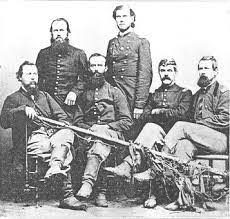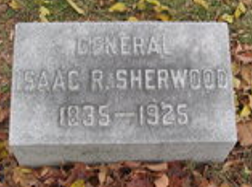The Sherwood family lived in Toledo most of their lives. In 1880, when Isaac was a probate judge in Lucas County, they lived on Erie Street with their two children, James B. and Nora K. (Lenora), and a servant, Lucy Holden. By 1900, they had moved to 2123 Ashland Avenue, Toledo, with a granddaughter, Katherine, 9, and a niece, Katherine, 20, who both attended school.
In 1900, Kate Sherwood delivered the memorial address for Decoration Day in Defiance, and her daughter, Lenore, sang for the event.
In 1910, Isaac was a representative to the U.S. Congress at age 73. Still residing on Ashland Avenue, Katherine, 65, had living with her: her niece, Katherine Duncan, 25, a public school teacher; Katherine Sherwood, a granddaughter; John and Lenore Pyle, daughter and son-in-law, and Helen Pyle, 20, a lodger. Dr. John Pyle was a physician with his own surgical practice. A servant, Ida Mahroan, helped keep the family going.
Katherine Margaret Brownlee Sherwood was quite notable in her own right. Born to Judge and Mrs. James Brownlee in Mahoning County on September 24, 1841, she was known as the "Poetess of the Congressional Circle." Kate wrote popular, patriotic poetry, was a prominent suffragette, a newspaper correspondent and editor, and an organizer of the Women's Relief Corp for the GAR.
Katherine died on February 15, 1914, while in Washington, D.C. Her obituary appeared in newspapers across the states. The Washington D. C. Times ran this obituary on February 15, 1914:
Katherine was buried in Woodlawn Cemetery in Toledo; her husband continued to serve in Congress until 1921. Much was made of Congressman Sherwood's 80th birthday with many national papers reporting on the event. This article (Toledo Bee origin) from the Xenia Daily Gazette appeared in the newspaper on August 14, 1918: "SHERWOOD IS EIGHTY YEARS OLD
Veteran Congressman , Strong, Vigorous and Active
at Age Most Men Have Retired
General Issac R. Sherwood, veteran Congressman, celebrated his eightieth birthday anniversary, Friday, August 17. The Toledo News Bee of that date has the following interesting story regarding him.
Isaac R. Sherwood, M. C., is 80 years old today, yet he is one of the most prominent and most active figures in the public eye in Ohio and in the United States. Snow white hair are his hair, eyebrows, and stubby mustache. But he carries his six feet straight as a young hickory, and his 220 pounds like a man of 45. His eyes are as bright and as keen as a youth.
'My doctor examined me yesterday,' said General Sherwood in his home at 2122 Ashland Ave. 'He took my blood pressure and says it's that of a man of 45; says I'm in better physical shape than I was ten years ago. I know he's right, too, for that is the way I feel.'
DEAFENED IN BATTLE
The Congressman's deafness,requiring an artificial eardrum, is no sign of age or infirmity. That came from the concussion of a shell as he led his regiment into action in the Civil War.
The General's career is brief: Orphan farmer's boy, struggling student, school teacher, printer, newspaper man, politician, soldier, horseman, statesman. He has been a success in every line of work he has undertaken.
When he retired from active life more than thirty years ago, in his 50th year, he had made himself a school teacher, a lawyer and a newspaper man. He had entered the army as a private and finished as a brigadier general, brevited by Lincoln for repeated distinguished service. He had served two terms as Secretary of the State of Ohio. He retired to his horses, his newspaper, his books.
A generation later, he came back. In 1906 he led the Democrats in his congressional district, the Republican by over 18,000. He secured 42 majority over his Republican opponent, Elmer G. McClelland of Wood County.
'My second time on earth,' says Congressman Sherwood. He referred to his election to Congress as a Republican from this district in 1872, defeating the popular Frank Hurd.
Isaac R. Sherwood is of English and Scotch descent. His grandfather fought the English with Ethan Allen at Ticonderoga. His father fought them in 1812.
WANTED AN EDUCATION
Bereft of his father, he went to school in the winter, working the other months. The system did not suit him. He worked for two consecutive years as a farm hand, and then took his money for a continuous school course, choosing Horace Mann, then the first educator of the country, as his instructor.
The youth attended the law school at Poland, Ohio, afterwards the Cleveland law school. Having qualified as a lawyer, he went to setting type on the Mahoning County Register at Youngstown.
At the age of 22, he bought the Williams County Leader at Bryan. Two years later he ran for probate judge and was elected. The following year, he was elected Mayor. Then Fort Sumter was fired upon. James B. Steedman and E. P. Bassett of Toledo went to Bryan for volunteers.
The first volunteer in northwestern Ohio was Mayor Isaac R. Sherwood. With him lined up, within 24 hours, 107 Williams County stalwarts who were formed into Company C, Fourteenth Ohio.

Officers of the 111th O.V.I- Standing: B. S. Southworth and I. R.
Sherwood. Seated: J. W. Mock, Capt. W. M. Beals, George W. Berry and
Jerry Bowlin
Mayor Sherwood served as a private for $11 a month until four months later when the regiment was disbanded. Then he enlisted in the 111th Ohio and was elected Lieutenant. Sherwood took part in the first battle of the war at Phillipi, West Virginia. He was made Adjutant and the Major over the Captains at their own request. Then through 42 battles, he rose to Lieutenant and Colonel. In December 1864, he was recommended by every officer of the brigade, with the approval of Major General Schofield, and was brevetted a brigadier general.
LEADS THREE PARTIES
The general, then 30 years of age, refusing from President Grant the appointment of Secretary of New Mexico, returned to newspaper work, but public service sought him, and he was elected, as a Republican, Secretary of State in 1868 and again in 1870. Then in 1872, the Toledo district sent him to Congress. He was elected Probate Judge of this county in 1878 on the National Greenback party, and in 1881 as a Democrat.
He retired from politics until called on to lead the desperate Democrat campaign in this district in 1906. He defeated James H. Southard for Congress in 1908 by 2,100; his fellow veteran J. Kent Hamilton in 1910 by a still large majority; 'the young man candidate,' Holland Webster, in 1912, by over 9,000; and William Cordell by over 13,000. He never knew defeat at the polls.
FOUNDED NEWSPAPER
In addition to his newspaper career at Bryan, he owned and edited the Canton News-Democrat, weeklies at Wauseon and Bryan, helped to found the Toledo Commercial, owned and edited the Toledo Sunday Journal, and owned the American Sportsman, Cleveland. For a time, he wrote editorials for the Cleveland Leader.
'A master politician,' they say of Sherwood. No opponent has been shrewd enough to trap him. He makes no unnecessary declarations, seeks no troubles. But he is prompt and fearless to go on record on real issues. He asks no handicap for his years, his soldier record, or public service.
FINANCED OWN FIGHTS
And one of the most political sayings is, 'I never allowed any men to contribute a dollar to me for my campaigns.'
A few months ago, his wife, one of the brightest and best-beloved women in Toledo, Kate Brownlee Sherwood, died. His daughter now makes his home for him.
In Washington, Congressman Sherwood is regarded as a phenomenon. The oldest man, in years, in Congress, he is the only representative who drives a team. He drives the fastest team in Washington and makes it a point to drive a new pair every year.
On both sides of the Capitol building, they do honor to the general. The house fills when he speaks. His memorial address to the Confederate veteran, George Washington Gordon, is one of the traditions of congressional oratory. He is chairman of the Houses' busiest committees, pensions, and has done more for the welfare of the old soldier comrades than any other man in or out of Congress.
CHATAUQUA? TOO BUSY
The general has been solicited repeatedly for the Chatauqua courses, but 'I am too busy just now,' the veteran says. 'Sometime later, maybe.'
'I think my father remains young, said Mrs. Leonore Sherwood, 'because of his sense of humor and because he has never lost his interest in affairs of all kinds.'
And of this, he is privately very proud - he has owned more fast horses than any man in Ohio.
And, at 80, unbent, unshaken, unafraid, he is looking forward, unruffled, to further years of useful and happy life."
When he was 88 years old, he wrote a book, Memories of the War, which he self-published. At the end, he lived in the Scottwood Apartments in Toledo with his daughter. A fire broke out in the apartment house in the spring of 1925, and since that time, General Sherwood's health deteriorated due to the smoke inhalation. He kept on until October, 1925, when he died of pernicious anemia.
His funeral was held at the Collingwood Presbyterian Church in Toledo. "The funeral will have a military aspect, the thinning ranks of the General's war buddies and veterans of the Spanish American war and World War being in the funeral cortege. The eleven surviving members of the 111th Regiment led by Sherwood during the Civil War will have places of honor in the funeral train." (Defiance Crescent-News, October 16, 1925)
The last time he was elected was in 1922 at the age of 87.
 |
Burial in Woodlawn Cemetery, Toledo, Ohio
|













